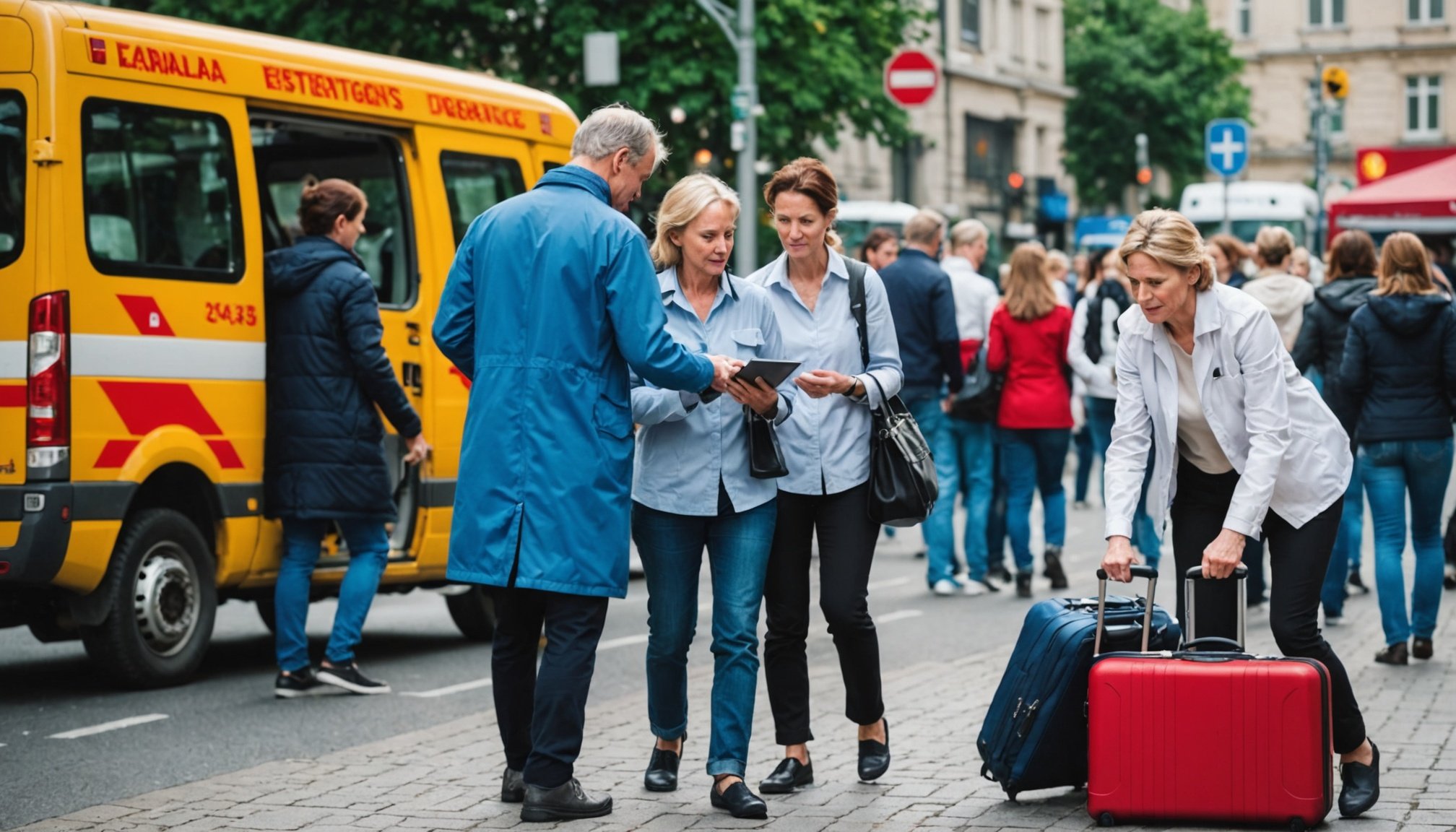Essential Tips for Safeguarding Your Health During Emergencies Abroad: A Comprehensive Guide
When traveling abroad, whether for leisure, business, or study, your health and safety should be your top priorities. Emergencies can arise unexpectedly, and being prepared is crucial to navigating these situations effectively. Here’s a detailed guide to help you safeguard your health during emergencies abroad.
Understanding the Risks and Preparing Accordingly
Before you embark on your international journey, it’s essential to conduct a thorough risk assessment of your destination. This involves understanding the local health risks, security concerns, and environmental hazards.
In the same genre : What are the implications of the gut-brain connection for mental health, and how can you support it through diet?
Research Your Destination
- Health Risks: Look into the prevalent diseases and health conditions in the area you are visiting. For example, if you are traveling to regions prone to water-borne diseases, ensure you have the necessary vaccinations and take precautions with your water intake.
- Security Concerns: Check the latest travel advisories from your country’s department of state or equivalent. Websites like the U.S. Department of State provide detailed information on safety and security conditions in various countries.
Gather Essential Information
- Travel Health Information: Visit the CDC (Centers for Disease Control and Prevention) website for the latest travel health information related to your destination. This includes vaccination requirements, disease outbreaks, and other health advisories.
- Local Health Care: Research the quality and availability of health care in your destination. Knowing where to go in case of an emergency can be a lifesaver.
Preparing for Emergencies Before You Leave
Preparation is key to handling emergencies effectively. Here are some steps you can take before your trip:
Obtain Comprehensive Insurance
- Health Insurance: Make sure you have health insurance that covers you internationally. This can include medical evacuation insurance, which is crucial in case you need to be transported to a different country for medical care.
- Travel Insurance: Consider additional travel insurance that covers trip cancellations, delays, and other travel-related issues.
Register with Your Government
- Smart Traveler Enrollment Program (STEP): If you are a U.S. citizen, enroll in the STEP program to receive important safety and security updates about your destination. This also helps the U.S. Embassy contact you in an emergency.
Pack Wisely
- First Aid Kit: Pack a first aid kit with essentials like bandages, antiseptic wipes, pain relievers, and any medications you might need.
- Important Documents: Carry copies of your passport, health insurance card, and any other important documents. Leave a copy with a trusted friend or family member back home.
Staying Safe and Healthy Abroad
Once you are abroad, there are several precautions you can take to ensure your health and safety.
In the same genre : Top Safe Anti-Inflammatory Herbs to Incorporate into Your Child”s Diet
Stay Informed
- Local Media: Keep an eye on local news and updates. This can help you stay aware of any emerging health or security issues.
- Embassy Alerts: Follow your country’s embassy on social media to receive timely alerts and updates.
Practice Good Health Habits
- Water and Sanitation: Ensure you drink safe water and maintain good hygiene practices. In areas with poor water quality, use bottled or filtered water and avoid consuming raw or undercooked foods.
- Vaccinations: Make sure you are up-to-date on all recommended vaccinations for your destination.
Be Aware of Your Surroundings
- Local Customs: Respect local customs and laws to avoid any unnecessary risks.
- Crowd Safety: Be cautious in crowded areas, especially during festivals or protests, where the risk of accidents or violence may be higher.
Handling Medical Emergencies Abroad
In the event of a medical emergency, knowing what to do can make a significant difference.
Know Your Local Health Care Options
- Hospitals and Clinics: Identify the nearest hospitals and clinics that offer quality care. Some countries have international-standard hospitals in major cities.
- Emergency Services: Know the local emergency numbers and how to contact them.
Use International SOS Services
- International SOS: If you have international SOS services as part of your insurance or travel package, know how to contact them. These services can provide immediate medical assistance and evacuation if necessary.
Child Protection and Mental Health
When traveling with children or considering mental health, there are additional factors to consider.
Child Protection
- Child-Friendly Facilities: Ensure that the places you visit and stay at are child-friendly and safe.
- Local Child Care Services: If you need child care services, research local options that are reputable and safe.
Mental Health
- Stress Management: Traveling can be stressful, especially in emergency situations. Practice stress management techniques like meditation or deep breathing.
- Seek Help: If you or someone in your group is experiencing mental health issues, seek help from local mental health services or your embassy.
Case Study: Flooding in Nigeria
The recent flooding in Nigeria’s Delta State highlights the importance of preparedness and community resilience. Here’s how the Nigerian Red Cross Society responded to the crisis:
Immediate Response
- Cash Grants: The Nigerian Red Cross provided multi-purpose cash grants to help affected families meet their basic needs, such as buying food and restarting businesses.
- Shelter and Health Services: They also provided shelter, health services, and protection for vulnerable individuals.
Long-Term Solutions
- Clean Water Access: The Red Cross helped establish new water points, ensuring access to clean, safe water. This improved school attendance and reduced health issues related to dirty water.
- Home Reconstruction: Homes destroyed by the floods were rebuilt, helping families recover and prepare for future emergencies.
Practical Tips for Emergency Situations
Here are some practical tips to keep in mind during emergency situations abroad:
Stay Calm and Follow Instructions
- In the event of an emergency, stay calm and follow the instructions of local authorities or emergency responders.
Keep Important Contacts Handy
- Make sure you have the contact information of your embassy, local emergency services, and your insurance provider easily accessible.
Have a Contingency Plan
- Prepare a contingency plan that includes how to leave the area safely, where to go, and how to contact your loved ones back home.
Table: Essential Items to Pack for Emergency Situations
| Item | Description |
|---|---|
| First Aid Kit | Includes bandages, antiseptic wipes, pain relievers, and any personal medications |
| Important Documents | Copies of passport, health insurance card, and other vital documents |
| Local Currency | Enough local currency for immediate needs |
| Water Bottle or Filter | To ensure access to safe drinking water |
| Non-Perishable Food | In case you are unable to access food |
| Flashlight and Batteries | For light during power outages |
| Multi-Tool or Pocket Knife | For various tasks |
| Sanitation Supplies | Hand sanitizer, toilet paper, etc. |
| Communication Devices | Phone, portable charger, and a two-way radio |
| Maps and Guides | Physical maps and guides of the area |
| Emergency Contact Information | List of important contacts including embassy and insurance provider |
Detailed List of Precautions to Take
Here is a detailed list of precautions to take to ensure your health and safety abroad:
- Enroll in the Smart Traveler Enrollment Program (STEP): This helps the U.S. Embassy contact you in an emergency and provides important safety and security updates about your destination.
- Follow Local Health Advisories: Stay updated on local health advisories and take necessary precautions to avoid diseases.
- Keep a Low Profile: Avoid drawing unnecessary attention to yourself, especially in areas with high crime rates.
- Monitor Local Media: Keep an eye on local news to stay informed about any emerging health or security issues.
- Prepare a Contingency Plan: Have a plan in place for emergency situations, including how to leave the area safely and contact your loved ones.
- Stay Informed About Local Customs: Respect local customs and laws to avoid any unnecessary risks.
- Ensure Child Protection: If traveling with children, ensure that the places you visit and stay at are child-friendly and safe.
- Prioritize Mental Health: Practice stress management techniques and seek help if you or someone in your group is experiencing mental health issues.
Quotes from Experts and Beneficiaries
On the Importance of Preparation
- “The response we’ve received from people who went through the trainings has been pretty incredible. People are saying [WebEOC is] very user friendly and easy to navigate. Having that buy-in from the start has been a huge win. People want to use it.” – Marissa Currier, Emergency Management Coordinator, Office of Emergency Management, City of Ontario, California.
On Community Resilience
- “The cash helped me buy food and basic needs, and I was able to start a firewood business to pay my children’s school fees. Things have gotten better.” – Blessing Emeldi, beneficiary of the Nigerian Red Cross Society’s flood response efforts.
Traveling abroad can be a rewarding and enriching experience, but it requires careful planning and preparation to ensure your health and safety. By conducting thorough risk assessments, staying informed, and taking necessary precautions, you can significantly reduce the risks associated with emergencies abroad. Remember, your health is your most valuable asset, and taking care of it during travel is paramount.
In the words of Blessing Emeldi, “When the floods come again, we will be better prepared.” This mindset of preparedness and resilience is what will help you navigate any emergency situation that may arise during your travels. Stay safe, stay informed, and enjoy your journey.











